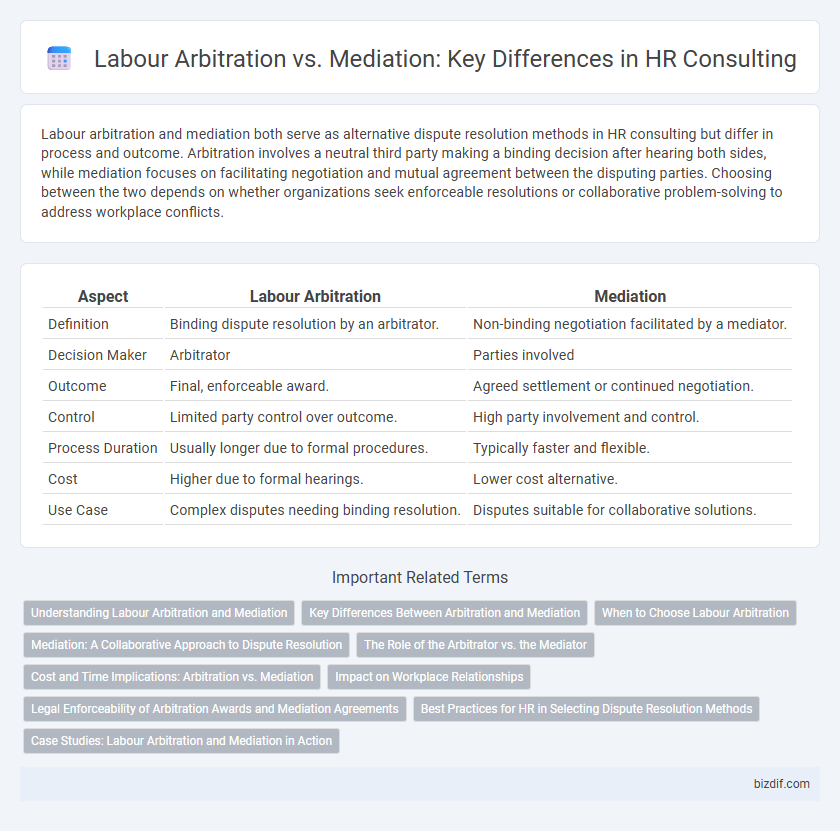Labour arbitration and mediation both serve as alternative dispute resolution methods in HR consulting but differ in process and outcome. Arbitration involves a neutral third party making a binding decision after hearing both sides, while mediation focuses on facilitating negotiation and mutual agreement between the disputing parties. Choosing between the two depends on whether organizations seek enforceable resolutions or collaborative problem-solving to address workplace conflicts.
Table of Comparison
| Aspect | Labour Arbitration | Mediation |
|---|---|---|
| Definition | Binding dispute resolution by an arbitrator. | Non-binding negotiation facilitated by a mediator. |
| Decision Maker | Arbitrator | Parties involved |
| Outcome | Final, enforceable award. | Agreed settlement or continued negotiation. |
| Control | Limited party control over outcome. | High party involvement and control. |
| Process Duration | Usually longer due to formal procedures. | Typically faster and flexible. |
| Cost | Higher due to formal hearings. | Lower cost alternative. |
| Use Case | Complex disputes needing binding resolution. | Disputes suitable for collaborative solutions. |
Understanding Labour Arbitration and Mediation
Labour arbitration involves a neutral third party making a binding decision to resolve disputes between employers and employees, often used when negotiations reach an impasse. Mediation, on the other hand, employs a facilitator to encourage dialogue and mutually agreeable solutions without imposing a decision. Understanding the distinct roles, processes, and outcomes of arbitration and mediation is essential for effective HR consulting and dispute resolution.
Key Differences Between Arbitration and Mediation
Labour arbitration involves a binding decision made by a third-party arbitrator to resolve disputes, whereas mediation facilitates voluntary negotiation led by a neutral mediator without binding outcomes. Arbitration is more formal, often resembling a court proceeding, while mediation prioritizes collaborative problem-solving and preserves employer-employee relationships. The choice between arbitration and mediation depends on factors such as desired speed, confidentiality, and the need for enforceable resolutions in labor conflicts.
When to Choose Labour Arbitration
Labour arbitration is preferred when parties require a binding resolution that ensures finality and enforceability, especially in cases involving complex contractual disputes or repeated violations. Employers and unions often choose arbitration to avoid prolonged litigation and to maintain a structured decision-making process with an experienced neutral arbitrator. Arbitration suits situations where negotiation and mediation have failed or when legal clarity and precedent are necessary for dispute resolution.
Mediation: A Collaborative Approach to Dispute Resolution
Mediation in HR consulting provides a collaborative approach to dispute resolution that empowers parties to achieve mutually beneficial outcomes through facilitated dialogue. Unlike labour arbitration, which involves a binding decision by a third party, mediation encourages open communication and creative problem-solving to address workplace conflicts. This method often preserves professional relationships, reduces legal costs, and promotes long-term organizational harmony.
The Role of the Arbitrator vs. the Mediator
The arbitrator acts as a neutral decision-maker who reviews evidence and imposes a binding resolution in labour disputes, ensuring a definitive outcome based on legal and contractual frameworks. In contrast, the mediator facilitates communication between parties, promoting voluntary agreement through negotiation without issuing binding decisions. Understanding the distinct roles helps HR professionals select the appropriate dispute resolution method to manage workplace conflicts effectively.
Cost and Time Implications: Arbitration vs. Mediation
Labour arbitration often involves higher costs due to formal procedures and the engagement of expert arbitrators, resulting in longer resolution times compared to mediation. Mediation typically reduces expenses by promoting collaborative dialogue and quicker settlements, minimizing the need for extensive preparation and legal fees. Organizations benefit from mediation's cost-efficiency and expedited timelines, making it a preferred choice for resolving labour disputes efficiently.
Impact on Workplace Relationships
Labour arbitration often results in a binding decision that may create a winner-loser dynamic, potentially straining workplace relationships due to perceived biases or dissatisfaction with the outcome. Mediation fosters open communication and collaboration, allowing parties to reach mutually satisfactory agreements that preserve trust and cooperation among employees and management. Choosing mediation can enhance long-term workplace harmony by addressing underlying issues and promoting shared understanding.
Legal Enforceability of Arbitration Awards and Mediation Agreements
Labour arbitration awards are legally enforceable and binding, ensuring that dispute resolutions are upheld by courts, which provides a definitive conclusion to workplace conflicts. In contrast, mediation agreements generally lack automatic legal enforceability unless parties formalize the settlement contractually, relying on mutual consent rather than judicial authority. Employers and employees must carefully consider the enforceability implications when choosing between arbitration and mediation for resolving labour disputes.
Best Practices for HR in Selecting Dispute Resolution Methods
HR professionals should evaluate the complexity and sensitivity of workplace conflicts when choosing between labour arbitration and mediation. Mediation fosters collaborative problem-solving and preserves employee relationships, making it ideal for disputes requiring ongoing interaction. Labour arbitration offers a binding resolution with a legally enforceable decision, suitable for cases demanding authoritative judgment and finality.
Case Studies: Labour Arbitration and Mediation in Action
Labour arbitration resolves workplace disputes by involving a neutral arbitrator who delivers binding decisions, as demonstrated in a 2023 manufacturing sector case where arbitration resolved a wage dispute, preventing a costly strike. Mediation, employed in a 2022 healthcare organization conflict, facilitated communication between parties and resulted in a mutually agreeable contract renewal without escalation. These case studies highlight arbitration's effectiveness in enforcing legal outcomes and mediation's strength in fostering collaborative solutions, optimizing conflict resolution strategies in HR consulting.
labour arbitration vs mediation Infographic

 bizdif.com
bizdif.com